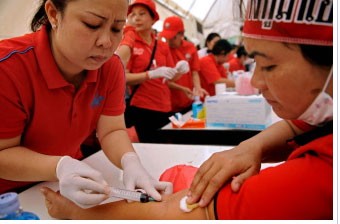Red-dressed Thai demonstrators Tuesday collected their own blood, planning to spill it at the government's gates in a symbolic sacrifice as they stepped up protests demanding snap elections.

Thousands of "Red Shirts", loyal to deposed premier Thaksin Shinawatra, were queuing up in Bangkok to offer a small amount of their blood in an unusual show of determination that sparked medical concerns.
It was the latest move in an anti-government street demonstration that has drawn tens of thousands of protesters to the streets of the capital since the weekend, watched over by a massive contingent of security forces.
"This blood is a sacrificial offering. To show our love for the nation, to show our sincerity," said Red Shirt leader Veera Musikapong, the first to donate.
The Reds aimed to collect the extraordinary amount of 1,000 litres (2,100 pints) of blood, which they planned to spill at the entrance to Government House in Bangkok's historic quarter at 6:00 pm (1100 GMT).
The group is protesting against the perceived elitism and illegitimacy of the government, which came to power via a December 2008 parliamentary vote that followed a controversial court ruling ousting ex-premier Thaksin's allies.
Last month another court decision confiscated 1.4 billion dollars from Thaksin, whose followers are largely from the poor rural north and fervently support the populist policies he introduced before being ousted in a 2006 coup.
On Monday the Red Shirts spent several hours massed outside a military barracks on the northern outskirts of Bangkok where Prime Minister Abhisit Vejjajiva and his government were holed up amid fears of violence by saboteurs.
The premier rejected the crowd's demands, and on Tuesday he again stood firm against calls to dissolve parliament.
"A decision cannot be made between protesters and the government, because it is related to the whole country," he said on television from the army barracks.
"House dissolution must happen on the condition that it will make the country move forward," he added.
A joint session of both houses of parliament was postponed on Tuesday due to the lack of a quorum, with some lawmakers fearing for their safety in the ongoing demonstrations, a parliamentary official said.
At a separate army barracks across the city, four grenades exploded on Monday, wounding two soldiers and raising tensions, although it was not clear if the attacks were linked to the Red Shirts.
A senior police official said a male suspect had been arrested on Monday for the grenade attacks but the man denied any involvement in the incident.
The public health ministry issued a statement late Monday raising health concerns about the blood drive. But organisers insisted only qualified medics were on hand, using one needle per person.
"If Abhisit is still stubborn, even though he does not have blood on his hands, his feet will be bloodied with our curses," protest leader Nattawut Saikur said.
A security force totalling 50,000 has been on hand across Bangkok and surrounding provinces for the rally, under a strict security law allowing authorities to ban gatherings and impose curfews.
Since the coup that ousted Thaksin, Thailand has been rocked by protests from both supporters and opponents of the former premier, who lives abroad to avoid a jail term for corruption,
The wealthy telecoms tycoon is loathed by the rival, royalist "Yellow Shirts", who are supported by Bangkok's elites and accuse him of graft and disloyalty to the revered royal family.
Thaksin, who was spotted over the weekend in Montenegro, made an impassioned plea to supporters by a video link to Bangkok on Monday evening for the third consecutive night, urging them to fight on.
The pro-Thaksin forces had dubbed their rally a "million man march" but police have estimated their numbers at only 86,000. Protest leaders gave various figures, all a lot higher than 100,000.
The protest could last another six or seven days, Deputy Prime Minister Suthep Thaugsuban told reporters on Tuesday.
























